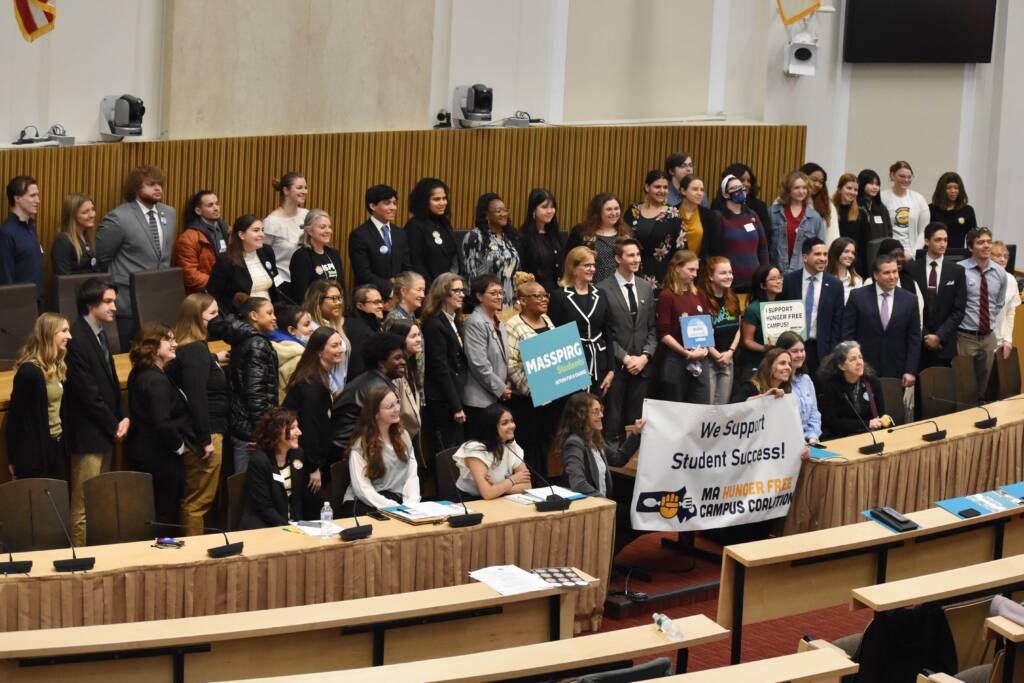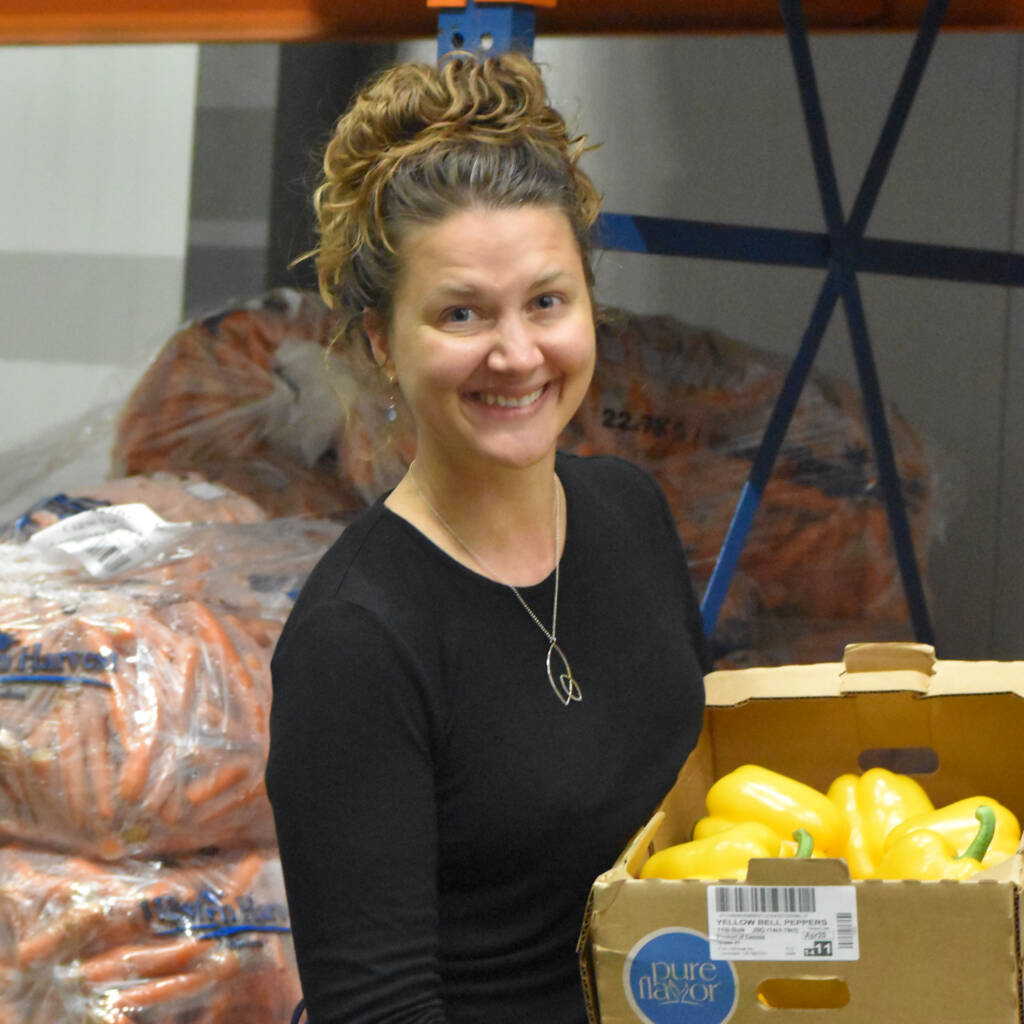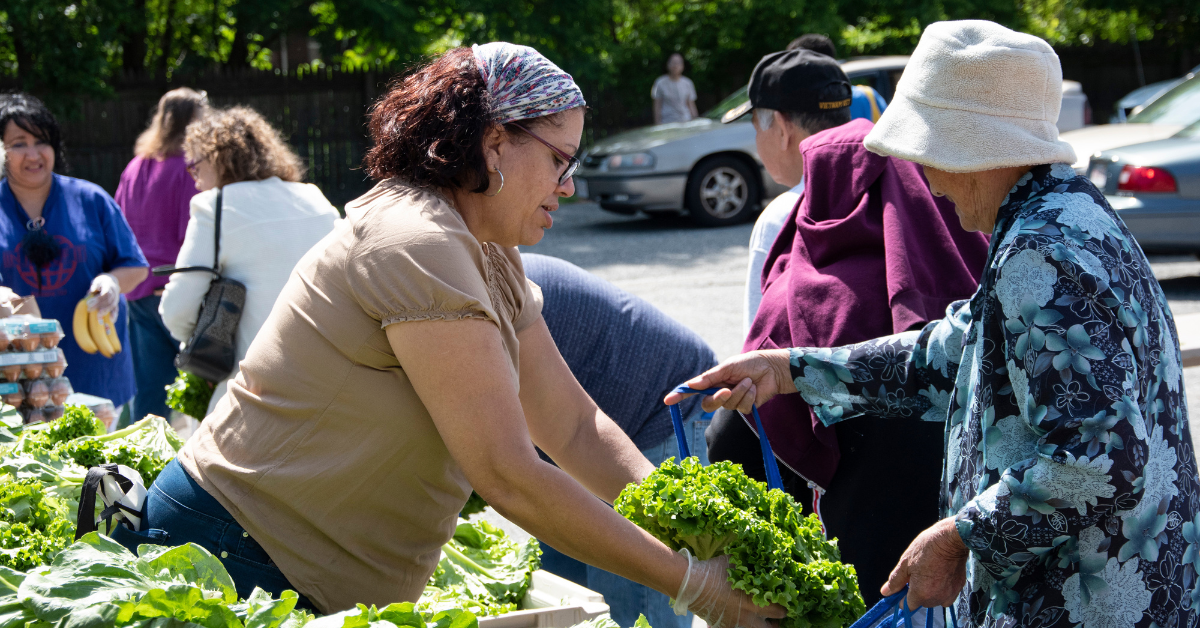Through its network of over 180 food pantries, meal sites, and shelters, the Food Bank of Western Massachusetts is working to advance local food assistance programs and address the root causes of hunger. Stop & Shop has supported this nonprofit organization through its Community Bag Program.
Tell us about the Food Bank of Western Massachusetts.
The Food Bank of Western Massachusetts was started in 1981 by a group of faith leaders and citizens who came together to collect and distribute surplus food in a parking lot in Springfield. The Food Bank was officially incorporated in 1982. We started by providing food out of Ludlow High School. Shortly after, we began operating out of a red barn in Hadley.
After we moved into that repurposed barn, we launched our first program. The Food for Elders Program provides one free brown bag of healthy groceries to seniors in the community. Today, the program is still operating. We partner with senior centers and distribute food to people who sign up, ensuring everyone gets the food they need.
Since then, we have evolved and changed a lot. Our mission is to feed our neighbors in need and lead the community to end hunger. What I like about this mission statement is that it has two parts. First, we get food out to folks who need that food assistance now. We lead the community in ending food insecurity by working to address the causes of hunger.
Our mission is to feed our neighbors in need and lead the community to end hunger.
To work toward the second part of our mission, we have an advocacy team that has lobbied for things like universal school meals, breakfast after the bell, and other legislation, programs, and investments that strengthen immediate support for the Commonwealth of Massachusetts’ (and the nation’s) food assistance network and address the causes of hunger. Right now, we are working on transportation since we know transportation is key to food access.
Our nutrition team provides workshops on topics like grocery shopping on a budget. This team also visits pantries to do taste tests and provide recipe cards. We know if someone receives a vegetable they don’t know how to cook, they won’t eat it. The nutrition team works to counteract this by providing resources and education. Additionally, we have a program called Food Assistance Navigation that assists people facing food insecurity with access to food resources and other wrap-around social services.
Overall, we take a holistic approach to addressing food insecurity in Western Massachusetts. We serve the four counties of Western Massachusetts: Berkshire, Franklin, Hampshire, and Hamden. Over the last year, we have provided food to over 120,000 people monthly through our network of more than 180 food pantries, meal sites, and shelters.
Over the last year, we have provided food to over 120,000 people monthly through our network of more than 180 food pantries, meal sites, and shelters.
What services do you provide to the community?
We are one of four food banks in the state of Massachusetts, so we work alongside the Greater Boston Food Bank, Worcester County Food Bank, and Merrimack Valley Food Bank. We are part of the Feeding America network of approximately 200 food banks across the country.
We function as a large distribution center, warehouse, education center, and advocacy center. Most of the food we distribute is through a member network of food pantries, meal sites, and shelters. In addition, we distribute food through our direct-to-participant programs like our Mobile Food Bank and Brown Bag Food for Elders Program.
Our Mobile Food Bank visits 26 sites in Western Massachusetts. We go to each community site on the same day each month, so people can count on us to receive food from those distributions. There are pallets of food containing a lot of fruits, vegetables, meat, and nonperishable goods. People don’t need to sign up ahead of time. They can simply come and receive the food they need.
Our Brown Bag Food for Elders Program distributes food to seniors, people with disabilities, and people who may be homebound. The food items are specifically selected to meet seniors’ special dietary requirements to help them stay healthy and active.

What sets Food Bank of Western Massachusetts apart from other nonprofits in your community?
Western Massachusetts is a generous and caring community with many great nonprofits in the area that are doing critical work to ensure people are taken care of. We are proud to be part of that community.
As I have worked and spent time at the Food Bank, what surprised me about the organization was our holistic approach to addressing the issue of hunger. Not only do we make sure people get the nutritious food they need now, but we also strive to work ourselves out of business. We envision a Western Massachusetts where no one faces food insecurity and everyone has access to nutritious food. We would like to see food pantries and food banks return to being an emergency food source, as they were originally meant to be. Right now, many people rely on our services to simply maintain their budget. People are making tradeoffs between housing, childcare, and transportation, so their food budget often suffers.
We envision a Western Massachusetts where no one faces food insecurity and everyone has access to nutritious food.
Tell us a story that illustrates the good work of your organization.
We know many kids are going to college while struggling with food insecurity, so we recently brought seven college food pantries into our network. We want students to be able to focus on going to school and learning instead of worrying if they have food to put on their tables when they get home. You can’t thrive in school without eating well.
I was recently at Greenfield Community College, where I had the chance to see their food pantry. I met with the program director to ask how things have been going since they joined our network a little over a year ago. They told me that the students really appreciate the variety of choices available to them since the partnership with the Food Bank began. These young adults are excited to get fresh fruits and vegetables that they know are coming from local farms.
It makes me smile to think that people are excited about having choices. It makes me proud to know that my work contributes in a small way to the product they receive at the food pantry.
What is your most outstanding achievement or contribution to the community?
We recently commemorated our first year in our new headquarters in Chicopee, which was a big milestone. Since moving into the new building, we have greatly increased our ability to store and distribute food. Our new home has enabled the Food Bank to provide more nutritious food to more people equitably, enhance efficiency, and deepen our engagement with the community to confront the causes of hunger.
Before this move, we had to turn away a million pounds of food a month. In our first year here, we’ve distributed 17 million pounds of food. We distributed more food this year than we ever have in our 42-year history.
What do you want people to know about the Food Bank of Western Massachusetts?
There are many ways to get involved with the Food Bank. Any action, large or small, can go a long way to support this critical work.
You can give your time and volunteer with us. We have food sorting shifts in our warehouse five days a week. For more information about our volunteer opportunities, visit our website.
Another way to get involved is by advocating. We know that people raising their voices and increasing awareness of food insecurity helps to open hearts and minds to the issue. If people understand how food insecurity impacts individuals and families on a daily basis, then we can really start to make change. Too often, people experiencing food insecurity are stigmatized. We want people to realize hunger is very common. It impacts people in every town and county in Western Massachusetts. Using your voice to advocate for change will help improve food security.
Thirdly, you can donate. Every $1 donated to the Food Bank is enough to provide three nutritious meals for someone facing hunger. Any donation will make an impact. Anyone can truly make a difference by donating to the Food Bank in any amount that’s meaningful to them.
How will you use the funds you’ve received from the Stop & Shop Community Bag Program?
Donations enable us to deliver and distribute food efficiently. We have trucks that go out every day to different food pantries, meal sites, and shelters. We also are able to use the money we receive to purchase more culturally responsive food. We want to ensure there are great choices for people who come to food pantries, and donations help us purchase food and increase the options available. All of the funds from this program are used toward our general operating costs.
We really appreciate Stop & Shop and its continued support. Stop & Shop has been an incredible partner to us and many other organizations in the area. We are grateful for their partnership and commitment to food security for all.

Interview with Jillian Morgan, Director of Development
Published November 21, 2024.
